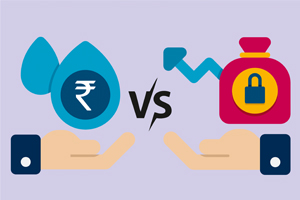As the end of the current financial year loomed large, Pranjali, who is an Account Manager at a major media company, found her hard work being rewarded with a year-end bonus of Rs. 2 lakhs. She was extremely happy with the bonus and started thinking of ways to maximise its potential. While she did not have any plans on how to spend the money, she had been working on shoring up her emergency fund, since her company did not offer her substantial health insurance and she did not want to be caught on the wrong foot, if a rainy day made its presence felt. With the addition of the bonus, her emergency fund came up to Rs. 3 lakh and Pranjali decided to invest the amount in a safe asset, rather than leaving it in her savings account. Accordingly, she began researching possible options and came up with possibilities which included bank FDs and liquid funds. The question of liquid fund vs FD was now on top of her mind.
Understanding liquid funds
Mutual funds are of various types, and these include everything from equity funds and debt funds to hybrid funds and liquid funds. Liquid funds are mutual fund schemes which park their corpus in fixed-income assets with a maximum maturity of 91 days or 3 months, including treasury bills, commercial papers, gilts, and bonds. The extremely low maturity of these assets secures them from interest rate and default risk, thus making liquid funds a relatively safe option for investment. Further, the short-term nature of these schemes makes them perfect for emergency funds, as these can be liquefied easily, as they do not have a lock-in period, while also offering you stable returns. You need not pick a fixed term either, thus enjoying potentially good returns without making any commitment.
Bank fixed deposits
At present, bank FDs are considered a very safe way of investing and earning fixed returns. While major banks were willing to offer her around 7%, some smaller NBFCs and companies were offering FDs with rates up to 8%. However, she would have to stay invested for a fixed tenure to enjoy the said benefits and given the case with emergencies, she could not really afford to do that. In fact, if she needed to withdraw her money before the end of the tenure, she would be required to pay a penalty, which would eat into her returns.
Liquid fund vs FD
Having understood the various aspects of the two options, Pranjali returned to the question of liquid fund vs FD. Given the possibly low duration of her investment, she realised that the returns on lower term FDs are actually lower than the currently high rate of inflation. So, if she left her money in an FD, she would, in all probability, see her money losing value by the time she needed to utilise it. Alternatively, liquid funds may offer her better returns and allow her all the flexibility she needed, given the absence of an exit load.
Where should you invest?
If you are also grappling with the liquid fund vs FD quandary and are keen on a safe and stable option with better returns through mutual funds, then a liquid fund could potentially be a good investment option for your needs. Given their investment in ultra-short-term assets and their focus on asset quality, liquid funds are only marginally riskier than FDs. Further, with inflation rising in a consistent manner, liquid funds have the ability to offer you sustainably more competitive returns, thus retaining the value of your money in both the short and longer terms.
Given these varied aspects and considerations, Pranjali decided to go with a liquid fund for her emergency corpus. Not only would she be able to get her money when she required it, but she would also enjoy better returns, while being able to participate in the growth of the market, making it a win-win scenario for her.
An investor education initiative by Edelweiss Mutual Fund
All Mutual Fund Investors have to go through a one-time KYC process. Investors should deal only with Registered Mutual Fund (RMF). For more info on KYC, RMF and procedure to lodge/redress any complaints, visit - https://www.edelweissmf.com/kyc-norms
MUTUAL FUND INVESTMENTS ARE SUBJECT TO MARKET RISKS. READ ALL SCHEME-RELATED DOCUMENTS CAREFULLY
Trending Articles
MUTUAL FUND INVESTMENTS ARE SUBJECT TO MARKET RISKS, READ ALL SCHEME RELATED DOCUMENTS CAREFULLY.




















